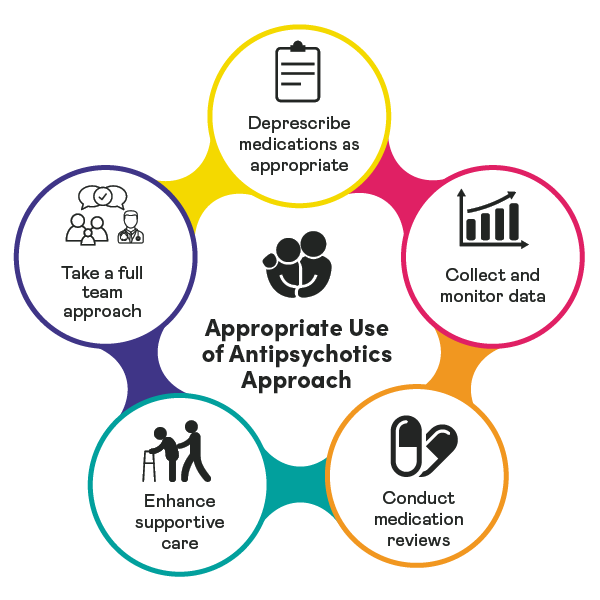Potential dangers of inappropriate antipsychotic use include increased risk of falls and fractures, confusion, stroke or even death. However, providing improved support for person-centred care and non-pharmacological approaches to manage responsive behaviours can help reduce inappropriate antipsychotic use.
The Appropriate Use of Antipsychotics (AUA) approach focuses on leveraging person-centered approaches to care as a means to deprescribe antipsychotics that no longer benefit and potentially cause harm for people living with dementia. Research shows this can improve quality of life and safety for the person living with dementia, work–life balance for care providers, and the satisfaction of family and essential care partners.
The foundation of the AUA approach is providing a supportive care environment for the person with dementia, getting to know them and tailoring care to their habits and preferences. By understanding possible causes for responsive behaviours, those providing care can try to resolve any unmet needs. Such person-centred care is usually the most successful way to decrease responsive behaviours. We recently launched the Sparking Change in the Appropriate Use of Antipsychotics (AUA) Awards Program to support long-term care homes across Canada to use person-centred approaches and reduce the potentially inappropriate use of antipsychotics for people living with dementia.

The image above describes the components of the AUA approach to care in practice. HEC first identified the AUA approach through our EXTRA: Executive Training Program. We then partnered with long-term care homes and provinces across Canada to spread the approach, first through a national collaborative, and then through provincial collaboratives in New Brunswick, Newfoundland and Labrador, Prince Edward Island and Quebec. We have supported hundreds of long-term care homes to safely deprescribe antipsychotics for people living with dementia.
Everyone involved in dementia care can learn about more effective ways to address responsive behaviours from these tailored resources other than prescribing antipsychotic medications. With support from expert advisors, we have created these simple tools designed to help long-term care staff and essential care partners provide the best support for people living with dementia.
1 Public Health Agency of Canada. (2019). A Dementia Strategy for Canada: Together We Aspire. Retrieved from: https://www.canada.ca/content/dam/phac-aspc/images/services/publications/diseases-conditions/dementia-strategy/National%20Dementia%20Strategy_ENG.pdf
